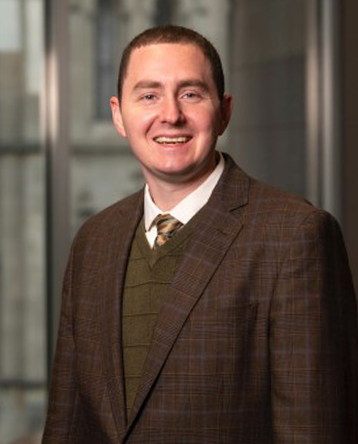Michael Mattarock joins CMU INI as its new associate director
Evan Lybrand
Apr 16, 2025

Michael Mattarock, CyLab faculty member, has joined the Information Networking Institute (INI) as its new associate director and assistant teaching professor.
This role works closely with INI director Dr. Dena Haritos Tsamitis, helping to oversee academics and collaborating with colleagues across the university, in addition to teaching specific courses. Bringing a great deal of experience in national security, cybersecurity and artificial intelligence, Mattarock will advocate for and develop INI’s federally funded academic programs, cultivate relationships with government agencies, and seek opportunities to secure funding.
Mattarock has served in various leadership roles at Carnegie Mellon University (CMU), most recently as executive director of national security research at CyLab, and as a consultant for government agencies like the National Aeronautics and Space Agency (NASA). Currently, Mattarock is completing his Doctor of Engineering in Adversarial Machine Learning degree from George Washington University (GWU).
Evan Lybrand, INI communications specialist, spoke with Mattarock about his experience and his new role at the INI.
Congratulations on your appointment as the INI's new associate director and assistant teaching professor! How are you feeling about the new role?
Mattarock: I am honored to have the opportunity to join the INI and teach cybersecurity focusing on operations, best practices and risk management as well as Artificial Intelligence (AI) policy and ethics. It has been a dream of mine for most of my career to teach and help prepare our future cybersecurity leaders for the evolving challenges we face globally. I'm also very excited to continue building upon the tremendous foundation of the INI over the last 35 years as I help lead the institute into the future as the new associate director. As the number one university in the world for both AI and cybersecurity, now is our time to shine and I'm ecstatic to be a part of that!
Could you tell us a little about your journey and area of expertise?
Mattarock: I was very fortunate early in my career to have the opportunity to develop new technologies for national security in a variety of roles and organizations, which helped set my skills apart from most. I studied international affairs and history as an undergrad at GWU, even spending some time on Capitol Hill, before a quick pivot to technical research and development. While at Gartner Research (a technology research and advisory firm for businesses), I was tasked with solving a major problem for the largest global Intelligence, Surveillance and Reconnaissance (ISR) platform, which led me to develop an open architecture standard for the U.S. Air Force. This was a major turning point in my career and cemented my interest in developing innovative solutions at the intersection of technology and strategy.
Since that time, I have engineered and led a myriad of digital transformations across the Department of Defense (DoD) and Intelligence Community through new cyber tools, architectures and approaches. This eventually led me to the Software Engineering Institute (SEI) here at CMU, where I was able to help launch the Artificial Intelligence Security Incident Response Team (AISIRT). My area of expertise is largely in secure AI, particularly the uses and protections of data poisoning attacks and the employment of adversarial machine learning.
How did you come to the INI?
Mattarock: As I entered my final year of doctoral study at GWU, I reached out to a CMU colleague to seek guidance on a potential path to a faculty role and she quickly pointed me to the INI as a well-aligned department given my non-traditional background. It is truly an honor for me to be joining the faculty at CMU and helping to lead the innovative INI!
What courses will you be teaching at the INI?
Mattarock: For the upcoming academic year, I will be teaching 14-817: Cyber Risk Modeling, 14-684: Cyber Law and Ethics and a brand-new course centered around AI ethics.
I'm excited to have the opportunity to help develop a new course around AI ethics, which has been a big part of my career in national security. As we've developed evolving AI capabilities across programs and platforms, responsible use has been a major point of influence I've championed, particularly in human-centered design. I've also had the opportunity to safeguard diverse systems across the national security ecosystem, which I believe will prove to be helpful in allowing students to benefit from a pragmatic approach to cyber risk modeling.
How would you like to see the INI grow?
Mattarock: I would like for us to continue to grow through attracting students, faculty and staff that develop innovative solutions to real-world problems, grounded in responsible and ethical use. It is my goal that we spread our no-limits mindset beyond Pittsburgh and Silicon Valley, to all parts of the world and societal populations.
What are you most excited about for the future of engineering and technology?
Mattarock: It is such an exciting time to be a practitioner in the engineering and technology space right now with limitless opportunities to evolve global capabilities. We have a real opportunity to show the world how to not only effectively embrace evolving technologies, but how to ethically uphold their implementation and use while making the world a safer place.
What are you most concerned about?
Mattarock: I am most concerned about the adversarial use of these same types of technologies egregiously affecting our ways of life. This is why it is paramount that we do our best to effectively influence ethical and responsible use as widely as possible.
What advice do you have for students?
Mattarock: Do not limit your studies to any preconceived notions you may have or perceived weaknesses—challenge yourself to new topics and disciplines that you may have not otherwise encountered. Many times, we learn more through exploring topics with different lenses than those we are most comfortable or familiar with.
